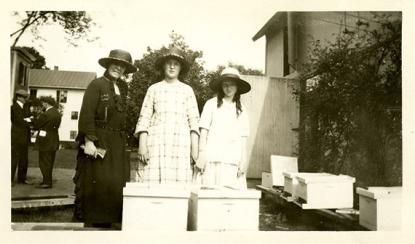It’s spring! And if that makes you think about baseball, perhaps you’d be interested in seeing a photograph of the Peabody baseball team in 1899. Or if you’re more interested in gardening, you might want to check out the tulips at the Thayer Estate garden in Lancaster circa 1910, the students at the Essex Agricultural School cutting asparagus in 1941, or Bee Distribution Day in 1921, when beehives were given to the students who tended the gardens for the Chicopee Public Schools.

These images are some of the more than 12,000 items currently searchable through the Digital Commonwealth. This site serves as a portal or gateway to the digital resources of libraries, museums, historical associations and other cultural institutions across Massachusetts. The resources include old photographs, maps, prints, and other printed material that have been scanned into digital format. These printed items can range from small objects like train tickets and party invitations to whole books. Although most of the current collection consists of images and texts, there are no restrictions on format, and sound recordings, videorecordings and other digital formats are also welcome here.
The Digital Commonwealth is a portal to all of the digital collections of Massachusetts libraries and cultural institutions. Although many of these collections relate to Massachusetts history, other material can also be found here. For example, there are also scholarly works, including abstracts of theses and dissertations, working papers and other resources from colleges and universities.
Over one hundred Massachusetts organizations are already members of the Digital Commonwealth. Some are already contributing their collections, either directly or by participating in a shared repository like Digital Treasures, which includes the collections of over twenty libraries from central and western Massachusetts. Other members have digital collections and are working on making them available in a compatible format. Many organizations are in the planning stages of digitization projects, or have just begun the scanning process, and we expect the Digital Commonwealth to see substantial growth over the next few years.
When you search the Digital Commonwealth site, you will get a list of results which may include resources from many different collections around the state. When you click on these, you leave the Digital Commonwealth site and go to the site where the resource actually “lives.”
The Digital Commonwealth has two purposes. One is to help searchers discover the many special collections available around the state. People following the link from the search results will find themselves on one of the repository sites around the state, where they may find other items of interest. Discovering the digital collections often helps people discover special collections around the state that they’d like to visit in person.
The other purpose of the Digital Commonwealth is to bring these collections together, bringing together related material from separate organizations.
In some ways, every search creates a new virtual collection. For example, if you do a search on shoe factory, you will find images of shoe factories in Lynn and Wakefield from the NOBLE Digital Library, in Westborough and Hudson from Digital Treasures, and even a great picture from the Lawrence Public Library of a giant shoe float built by the Shoe Lace Company for a 1933 NRA parade. A search on Calvin Coolidge finds images from the Calvin Coolidge Presidential Library and Museum at Forbes Library in Northampton, but also photographs of Coolidge appearing at events in Swampscott and Lynn.
Digital Commonwealth members may coordinate their digitization effort in order to create more virtual collections and online exhibits that bring together related material from different organizations. We also plan to work with others to develop guides and lesson plans and other material to help people explore and use these resources.
Massachusetts has a long, rich and significant history: the colonial period, the Revolutionary War, the seafaring trade, agriculture, the Industrial Revolution, urbanization, immigration, and much more. We’re the birthplace of Presidents, and the home of many distinguished authors and poets including Nathaniel Hawthorne, Ralph Waldo Emerson, Henry David Thoreau, Herman Melville, Louisa May Alcott and Jack Kerouac. We’re also the home of many highly-respected colleges and universities. We have significant resources on paper and in other formats, and increasingly in digital format. Working together, we can make these resources available in many different ways, serving the needs of Massachusetts residents and people around the world.
Digital Commonwealth was initially funded by a federal Library Services and Technology Grant from the Institute of Museum and Library Services administered by the Massachusetts Board of Library Commissioners.
— Elizabeth Thomsen is the Member Services Manager of NOBLE, the North of Boston Library Exchange, and the author of "Rethinking Reference: A Reference Librarian’s Practical Guide to Surviving Constant Change." She keeps a professional blog.

